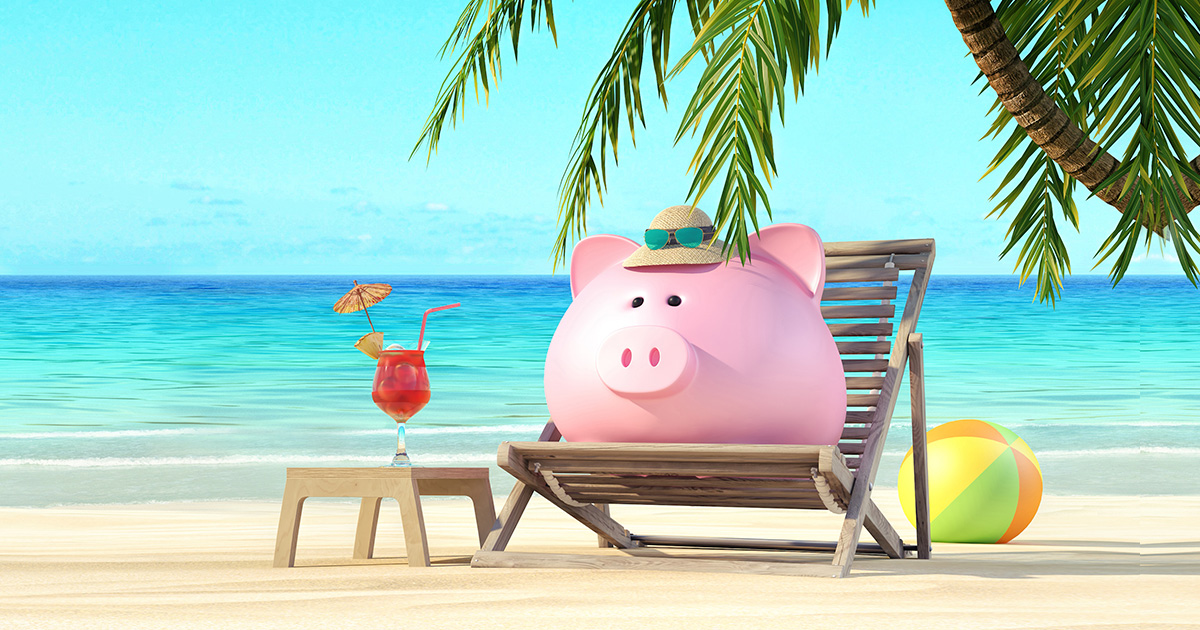With the longer days of summer upon us, it can be easy to overindulge, under plan and let our budgets slip a bit. But the good news is you don’t have to cancel your summer plans to keep your finances in check. Take a look at our 20 tips for staying on budget this summer, decide which make sense for you and start implementing today.
Lower bills, bigger thrills
We aren’t suggesting you shut off your water services to save a couple bucks – but there are small adjustments that you can make to save money on your utility bills without being too inconvenienced.
- Come on in, the water’s fine. Who wants to hop into a scalding shower after mowing the lawn anyway? Studies suggest that turning the temperature on your hot water heater down to 120 degrees can save you 4% to 22% annually on your hot water heating costs. Washing your laundry on the cold cycle and then hanging your clothes outside to dry can provide addition energy bill savings.
- Less water in the tank means more money in the bank. Placing a water displacement device in your toilet’s tank, like a filled water bottle, allows the toilet to use less water each time you flush. The average household saves 10 gallons of water every day by implementing this trick, and you likely won’t even notice the change.
- A few degrees can make all the difference. Setting your air conditioner a few degrees higher can result in a noticeably lower electric bill. If you heat your home to 72 in the winter, you probably don’t need to cool it to 68 in the summer.
- A dirty filter can set your air conditioner off-kilter. Old, dirty filters can restrict airflow and can cause your air conditioner to become less efficient, increasing your electric bill and potentially causing damage to the unit over time.
Reduce what you pay, every day
Covid-19 has many people spending more time at home this summer. These minor adjustments to your day-to-day routine can add up to a positive boost in your budget.
- Leftovers are your friend. Plan your meals so that Monday’s dinner can become Tuesday’s lunch. But remember, not all leftovers are created equal. While fried foods, greens or shellfish might not be as appetizing the next day, pasta, meats, casseroles and soups are often just as good reheated.
- Make it a subscription-free summer. Don’t waste the beautiful summer months in front of the TV. Cancel those streaming services and cable subscriptions for a few months and learn a summertime hobby, pick up a new sport, dust off your board games or start a book club.
- H2O is the way to go. Stay hydrated and save money! Instead of paying for bottled water, soft drinks or juices, invest in a large refillable water bottle. Not only are you saving money and helping the environment, but having a stylish water bottle to carry around with you will encourage you to stay hydrated during the dog days of summer. Adding cucumber slices or frozen fruit can turn boring water into a refreshing treat.
- Go generic. When it comes to basic grocery items like canned vegetables or pasta, chances are you and your family won’t even taste the difference between name brand and the less expensive store brand option. In fact, studies show that 75% of shoppers believe store brands are just as good in quality as major national brands.
- The world is your gym. The average monthly cost of a gym membership in the U.S. is $58. If you haven’t already paused your gym membership due to coronavirus closures, now’s the perfect time to opt for free or inexpensive summer activities such as biking, running, walking, hiking, swimming and yoga.
- Fewer fill ups. Changes to your transportation habits, such as biking instead of driving, can significantly cut down your weekly gas costs. If your household has two vehicles, choose the more fuel-efficient vehicle and carpool with your family when possible. Using websites like GasBuddy.com allows you to find the cheapest gas in your area before heading out to fill up.
- Use the weekly weather forecast to plan when to mow. Cutting your grass the day before rain is forecasted allows nature to do the watering for you. Also, leaving the grass a little longer will reduce the chances of it drying out in the sun, which means you don’t have to water it as often.
Treat yourself
Saving money doesn’t have to mean canceling your summer travel or entertainment plans. Smart planning allows you to still have fun without breaking the bank.
- Plan ahead. Whether you’re heading across the country or taking a weekend trip, doing your research early can help reduce travel costs. Try using a flight alert app that will notify you when the price of your potential flights changes, allowing you to book flights at their cheapest. Also, consider booking an Airbnb or other home-sharing service, which can often be more cost-effective than hotels or resorts.
- Make it a “staycation” instead. With current Covid-19 concerns and restrictions, treating yourself to a “staycation,” is both a great money-saving option and a way to limit your exposure. Make a list of places nearby that you haven’t visited before and be a tourist in your own city. If you’re missing the relaxation that many vacations offer, put away your electronic devices and set up a DIY spa night at home.
- Forget Route 66—get your kicks locally. Most cities have local event calendars highlighting entertainment options. Whether it’s an outdoor concert, admission-free days at local museums or socially-distanced gatherings at the park, community events are a great way to have fun at little or no expense.
- See your wardrobe in a new light. Instead of spending money at the mall to freshen up your closet, try creating new looks with the clothes you already own. It’s easy to fall into a habit of wearing the same outfits on a rotating basis, pairing the same pants with the same shirt time after time. Try pulling out all articles of clothing you own and see what new and different outfit combinations you can create. With most things, including fashion, what once was old is new again!
Plan for success
Saving money usually doesn’t just happen on its own. Having a plan provides structure and goals to keep your summer savings on track. Whether you’re looking to make some extra cash on summer side hustles or you’re trying to cut down on expenses, here are a few easy tips to get you started.
- Set up a separate summer savings account. Most financial institutions, including Verve, allow their members to have multiple savings accounts in addition to their main savings. Being able to see your summer-specific savings can be a motivator to stay on budget and help keep you confident that you have the money necessary to make your summer plans happen.
- Build a budget. Mapping out the money you have coming in and your recurring bills and payments, as well as allotting a weekly allowance can help you visualize where your money is going. A budget can show where you can reduce unnecessary expenses, as well as when you’ll have extra cash to put toward your summer goals.
- Say goodbye to ATM fees. It’s your money, why would you pay to access it? Verve gives members access to fee-less withdrawals at thousands of ATMs across the country. A few dollars here and there can really start to add up.
- Get rid of that clutter. Many people have spent the last few months at home decluttering and organizing. This summer is the perfect time to sell those things you no longer need and add your profits to your summer budget.
- Turn hobbies into cash. Do you have a hobby that might earn you some extra money? From upcycling furniture to walking dogs, there are plenty of ways to get a little extra jingle in your pocket this summer.
Trying to implement all of these tips can be intimidating. Start with a few that you can implement today and revisit the list when you’re ready to add more. Need help setting up a summer savings account or setting financial goals? Meet with one of our team members (virtually or in person) to get started today.






 Federally Insured by NCUA |
Federally Insured by NCUA |  Equal Housing Opportunity |
Equal Housing Opportunity |